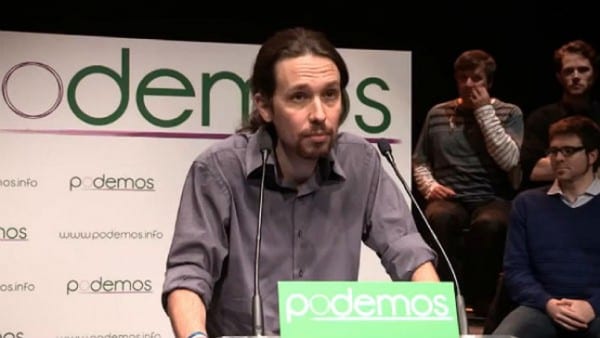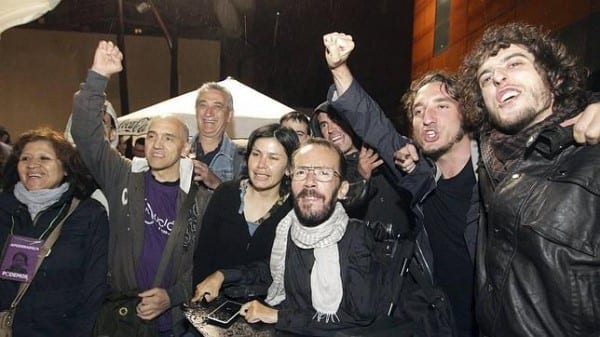Podemos: Is it really a true left party or another formation ready to stabilize capitalism?
Take 1
LOUIS PROYECT
The Rise of Podemos: A Serious Left Alternative to the Great Impasse

Podemos leader Pablo Iglesias at the podium.
[dropcap]T[/dropcap]his article provides some background on Podemos in Spain, a broad-based radical party that has been likened to Syriza in Greece and that like Syriza could very possibly become a ruling party in the not too distant future. It was written for the relaunch of North Star, a website that calls for the creation of a non-sectarian, broad-based anticapitalist party—in other words, an American Podemos.
For those of us in the United States who are working to create something equivalent, there are many lessons to be drawn even if there are sizable differences between the USA and Spain. But what they do have in common is key: a two-party system that has effectively maintained hegemonic control over politics.
The parties
The People’s Party (PP) currently rules Spain. Founded in 1989, it is far to the left of the Republican Party in the USA but is its counterpart—the major party openly representing the class interests of big business. It came out of a fusion of the People’s Alliance that was founded by a Falangist government official angling for respectability in the post-Franco era and smaller liberal parties. On the European political spectrum, it has much in common with the German Christian Democrats and the Conservative Party in Britain.
The previous government was in the hands of the Socialist Workers Party of Spain (PSOE). Despite the Leninist sounding name, this is the social democratic party that dates back to 19th century and that was part of the Popular Front in the 1930s. In 1979, it disavowed the Marxist language of the traditional party program even if it had been there only for show. The People’s Party replaced it in 2011 because Spaniards felt that it was not doing enough to lift the economy out of the ongoing depression. In effect, the vote was similar to the recently held midterm elections in the USA where Republicans replaced Democrats as the majority.
The Left Opposition
Podemos emerged to a very large degree out of frustration with the revolving door of bourgeois politics. As such, its emergence should serve as an inspiration for the American left even if it fails to meet the expectations of those on the left who wish that the class struggle were moving at a faster pace. (Who doesn’t?)
Before Podemos was launched in January 2014, there were two coalitions that operated to the left of the PP and PSOE. The first was called United Left and was led by the Communist Party of Spain. It has oscillated between conciliatory and adversarial stances toward the PSOE, usually reflecting the degree to which a new version of the Popular Front was considered viable. A more adversarial approach went hand in hand with the growth of radicalism in Spain following the economic crisis even as the United Left continued to put out feelers toward the PSOE. In a delicate balancing act, it had to persuade impoverished and disaffected youth that it was more radical than the PSOE, a tough sell.
To the left of the United Left stood the Anticapitalist Coalition (IZ), a formation founded in October 2011 that coalesced Trotskyist and other far left organizations after the fashion of Socialist Alliance experiments in Britain and elsewhere. Both it and United Left have grown markedly since Spain was convulsed by the massive protests in 2011 that became known as the 15-M Movement.
15-M Movement
This was Spain’s Occupy movement basically. It stands for May 15, 2011, when young people flocked to the streets and took over public spaces in 58 cities. The main issue was unemployment, which was officially at 21.3 percent. At the core of its program was a belief that the two-party system was bankrupt.
As was the case with the Occupy movement in the USA, some of the leaders had a “horizontalist” orientation that precluded electoral politics, an understandable position given the failure of the two-party system. The emphasis was on locally controlled, consensus-based decision-making on behalf of direct actions meant to force the government to put the needs of the people first. Understandably, it was hesitant to align with the old left parties that were seen as part of a corrupt system.
Given the severity of the economic crisis in Spain, the movement reached and involved a larger proportion of the population than the Occupy movement ever did in the USA. Its massiveness created the social power that made Podemos possible. Of the millions of people who participated in the occupations and marches, it is doubtful that many considered themselves disciples of Bakunin or Karl Marx for that matter. They were looking for a serious alternative to the impasse and likely to embrace radical measures as long as they spoke to their desperate condition.
Podemos’s Midwives
Over the weekend of January 12-13 2014, a group of activists and intellectuals founded Podemos on the basis of the principles articulated in an article titled Mover Ficha or “Making a Move” as in a chess game. The key section of the document advocates work in the electoral arena but not on the basis of the traditional horse-trading of the left parties:
In the next European Parliament elections there needs to be a candidacy that offers itself to the wave of popular indignation that astounded the world. We are glad to see the advance of the forces of the left, but we are conscious of the need to do something more in order to set in gear the changes we need. It is a time for courage and for not allowing the closure of the window of opportunity that the commitment of so many good people has opened. We need a candidacy of unity and of rupture, led by people who express new ways of relating to politics and which will entail a real threat to the two-party regime of the PP and PSOE and those who have taken our democracy hostage.
As it turns out, the authors of “Making a Move” were members of the Anticapitalist Left (IA), a key component of the Anticapitalist Coalition, and the official section of the Fourth International that had long ago abandoned the “vanguardist” conceptions that attended its birth.
The Anticapitalist Left was following the lead of the New Anticapitalist Party (NPA) in France, the transformed former section of the Fourth International section that had decided a few years earlier to dump the “Leninist” baggage it had inherited from the 1930s and shift rapidly toward becoming part of a process that spoke to 21st century realities.
For members of the IA, the launching of Podemos was necessary as a way of providing an alternative to the pending CP-led United Left bloc with the PSOE. The young people who were part of the May 15thmovement had shown little affinity for the business as usual policies of the Spanish social democracy.

The above poster sums up Marxist objections to Podemos. Click on the image to read it. The translation to English is offered in the notes. (1)
In August 2012, I had expressed hopes that something like this would have been possible in the United States but unfortunately there were far too few socialists willing to think outside the box. Most saw the Occupy movement as an opportunity to recruit members to a “vanguard” formation rather than to help create a movement that transcended the territorial imperatives of the traditional left. That need still exists and is one that the North Star is dedicated to making possible.
As an example of the sort of non-proprietary outlook that informed the IA leadership, they never saw Podemos as a competitor. They were always searching the horizon for political opportunities that would allow the entire radical movement to grow stronger. This is the kind of attitude North Star hopes to foster.
The left opposition to Podemos
For the scandal-plagued Socialist Workers Party of Great Britain (SWP), Podemos is just another example of a broad left party that will fall short of the task of leading a proletarian revolution. Its newspaper complained: “The leaders of Podemos and Syriza want to replace the people in government with others who they argue would do a better job. But power doesn’t stop with the people in office. Elected governments are still part of a capitalist state that is made up of powerful unelected bureaucracies, not to mention the police and the army.” This is certainly true but it is unlikely that the party that can replace the cops and the army with the people in arms after the fashion of the Paris Commune simply articulating such a need. This is a form of magical thinking that the left needs to avoid.
There is also a problem lumping Syriza together with Podemos. Leaving aside whether Syriza deserves all the criticism it has received from groups like the SWP, how much sense does it make to group them together? Syriza was a project of the one-time Eurocommunist wing of the Greek Communist Party, a party whose leaders have been committed to Keynesian type reforms and who looked to Kirchner’s Argentina for insights on how to resolve the economic crisis in Greece.
On the other hand, Trotskyists wrote Podemos’s founding document and its principal leader Pablo Iglesias was a 24-year-old activist on the Spanish streets only 4 years ago. An article in the International Socialist Organization’s newspaper described a man who would have little to do with Eurocommunism:
Yet no one should be fooled into thinking that Iglesias believes that ideologies have been made obsolete. In interviews and articles, he has revealed how he is influenced by Marxist thinkers such as Lenin, Salvador Allende, David Harvey and Ernest Mandel. If anything, his approach reveals a mixed take on politics–part Gramsci, part George Lakoff–Iglesias has dropped old symbols that he believes could become liabilities because of negative historical associations with potential voters, and framed the debate around the question of the deprivations suffered by the majority of people in society, while the tiny elite becomes richer.
Dropping old symbols is the takeaway phrase for us at North Star since it describes our efforts as well to consign symbols such as the Red Star and the hammer and sickle to the historical archives where they belong. In the course of struggle, the American people will develop their own meaningful symbols of struggle that are rooted in our national experience just as the Spanish left is doing today. It is of some significance that they chose the name Podemos rather than the Revolutionary Workers Party or some other combination of the same kinds of words.
Podemos’s future
If you keep in mind that parties like Syriza and Podemos simply represent the state of the class struggle at a given period, there is no reason to compare them to the more evolved forms of a more advanced stage of the class struggle. As was the case with the abolition of slavery in the USA, it took a steady progression of parties before the Republican Party—with its radical wing—arrived on the scene. We can expect detours and blind alleys on the route to abolishing wage slavery as well.
There have already been complaints about Podemos “selling out”, even if it has not passed its first birthday. On Facebook, a Reuters article has been circulating that claims Podemos toned down its radical politics in a recently released policy paper co-written by Vicente Navarro, a long-time contributor to Monthly Review, CounterPunch and other such radical publications, and Juan Torres López, an economist whose El Pais article comparing Angela Merkel to Adolph Hitler was retracted by the paper. The Reuters article points out that the article, titled “Democratizar La Economía Para Salir De La Crisis Mejorando La Equidad, El Bienestar Y La Calidad De Vida” (“Democratize the Economy in Order to Exit the Crisis and Improve the Equity, Well-Being and Quality of Life”), no longer calls for nationalizing the utility companies and lowering the retirement age from 65 to 60.
On page forty of the Navarro-López white paper, there is a section dealing with concrete recommendations. I hope that the entire paper will be available in English at some point, but it is worth using a Spanish-English translation tool to see some of the proposals. For example, they advocate increasing the minimum wage and reducing the disparity between management salaries and the workers’ wages, which is now 127 to 1 on average. By comparison, this makes the USA’s 86 to 1 ratio look populist by comparison. Of course, if a left party in the USA introduced legislation that attacked the right of CEO’s to enjoy obscene salaries, we might expect the government to arrest its leaders for violations of the Smith Act.
To drive the point home, imagine that we had a party in the USA whose economic policies were co-written by someone who had written dozens of articles for CounterPunch over the years. And furthermore imagine that this party was polling first as the next party to take power in 2016 with a candidate like Howie Hawkins slated to occupy the White House rather than a park. This is the next step in American politics and one that begins to make the slogan ‘a better world is possible’ seem not so utopian.
Louis Proyect blogs at http://louisproyect.org and is the moderator of the Marxism mailing list. In his spare time, he reviews films for CounterPunch.
Take 2
Spain’s Podemos presents its pro-capitalist economic programme
By Alejandro López
WSWS.ORG (A Trotskyist organization affiliated with the Social Equality Party).
Podemos is a Spanish pseudo-left party created in January for the European elections by the Pabloite Anti-Capitalist Left (Izquierda Anticapitalista, IA). Its purpose is to fill the vacuum left by the collapse of the major parties.
Podemos has presented its economic programme for next year’s parliamentary elections. In the 60 pages written by economists Juan Torres and Vicenç Navarro and presented by Podemos leader Pablo Iglesias and sociologist Carolina Bescansa last Thursday, the party has officially abandoned the anti-capitalist pretensions of its programme for the European elections held last May.
The programme declares that the main aim of Podemos in government—some polls suggest it is currently the leading political force in Spain—should be to “guarantee political stability generating the maximum security and confidence in the management that will be undertaken.”
It warns that Podemos could receive a negative reaction from the financial markets and a rise in the interest rates on Spanish bonds, “even though the reality is that [Podemos] is the insurance policy that will resolve Spain’s problems, like corruption and the distrust in the institutions, that all the economists know are some of the main negative factors for the development of economic activity.”
These lines are a pledge to the financial elite that any government in which Podemos plays a part will not mount a genuine challenge to its interests. Iglesias was even more blunt than the document, declaring that Podemos will not “sell smoke” like the populist promises of the ruling Popular Party (PP) or its predecessor the Socialist Party (PSOE), but will aim to be seen “with good eyes” by the business community.
The economic crisis in Spain is not rooted in corruption or misguided “neo-liberal” policies, which Navarro and Torres have, for years, in common with the pseudo-left as a whole, blamed for all economic problems. These are merely symptoms of a deeper systemic crisis of world capitalism.
These same objective conditions have undermined the so-called Scandinavian Social Democratic model, which the two economists uphold and Iglesias maintains is at the heart of Podemos’s economic programme. Since the 2008 economic crisis, Norway, Sweden and Finland have all imposed austerity measures. In Finland and Sweden there are now open discussions underway to end their official neutrality and join NATO in its campaign of military encirclement of Russia.
In October, Podemos all but abandoned its demand for a “citizens’ audit” of Spain’s public debt with the declaration that “the goal is not to not pay the debt … We can try to promote an orderly debt restructuring process in Europe and especially in the peripheral countries…”
Navarro and Torres are now advising Podemos not to use the word “restructuring.” Instead they talk about “negotiating with the markets flexible payments of debt,” “grace periods” and “partial ‘haircuts’.”
With regards to pensions, Podemos has abandoned its previous demand to reduce the age of retirement to 60. They are now calling for it to remain at 65 and not increase to 67 by 2027 as negotiated between the PP government, the unions and big business in 2013.
Podemos calls for a 35-hour workweek and the strengthening of the unions so they can increase salaries and pensions. But, again, the transformation of the unions into arms of management and the primary means through which the ruling class has imposed wage cuts, redundancies and suppressed any resistance to its austerity measures is a universal phenomenon.
With regard to the universal basic income that was another main proposal in the European elections, the draft now vaguely speaks of “aid” for “any person who has no income.”
The economic programme also omits previous proposals with respect to nationalisation. In January, the party’s manifesto promised nationalisation of the banks and energy companies. By the time of the May elections, this had changed to the “recovery of public control in strategic sectors … through public acquisition of a part thereof, which guarantees a majority stake …”
The abolition of private employment agencies has also disappeared from Podemos’s new programme.
Any polemic against Podemos is like shooting a moving target. As soon as an article on Podemos has been published, it becomes obsolete due to the rapidity of its right-wing trajectory. The actions of Iglesias have followed a similar course.
Iglesias recently applauded the speech of “brave” Pope Francis in the European parliament, who had departed from the rhetoric of his predecessors and condemned “the scandal of the financial powers who are kidnapping our democracy.” Afterwards, Iglesias called a press conference in Strasbourg to praise the speech and to state that he “would like to meet with the pope, in the Vatican or in [the Madrid neighbourhood of] Vallecas, wherever possible. … We would agree on a lot of things.”
This is the Pope who has been accused by priests and lay workers of handing them over to the torturers as part of the “cleansing” of the Church of “leftists” during the “Dirty War” waged by the Argentine military junta between 1976 and 1983.
Days before, Iglesias met with the president of the United Spanish Military Association (Asociación Unificada de Militares Españoles), Jorge Bravo, with the objective of “constructing a political programme that includes the inalienable rights of the military as citizens and offers a modern vision of the armed forces to the citizens.”
At the conclusion of the meeting, Iglesias declared, “Podemos assumes as legitimate the demands of the military associations and promises to defend them. For this reason, the Coordination Council of Podemos will maintain a strong collaboration with the representatives of the associations of the armed forces …”
The bloody role of both the army and the Catholic Church in 20th century Spain has been well documented, most brutally during the crushing of the Spanish Revolution in the 1930s and the imposition of a decades-long dictatorship under General Francisco Franco. For someone like Iglesias who claims to be on the left to glorify the Pope and meet with the military reveals the true character of this organisation.
The pro-capitalist economic programme now presented by Podemos exposes the criminal role played by IA. In a recent statement, after expressing reservations about the bureaucratic structure that was imposed at the founding congress and the way it was marginalised by the Iglesias faction, IA conceded it would “adapt to the new framework” and “continue to work as loyally as we have until now, doing everything in our power to ensure that we can win the elections … to transform society and not disappoint the hopes that millions of people are placing in us.”
It is inevitable that those hopes will be betrayed by Podemos, whose purpose is to mobilise a section of the middle class on a patriotic pro-capitalist programme.
Notes
(1) We hereby furnish the translation to the poster above criticizing Podemos and its main leader, Pablo Iglesias.
Program of the PPI
The Pablo Iglesias Party
1. Do not exit the EU, instead try to change it from within
2. Support the Syrian rebels, we demand more weapons for them!
5. Do not break with capitalism, instead apply some Keynesian ointment, just in case
7. Do not expropriate private banks, instead create a public bank with our savings
9. Do not support Communist political prisoners, instead mock them
10. Condemn North Korea, the Naxalites, and any political actor that is not bourgeois democratic
Vote for us!! We won’t let you down. We will provide the best cover so the system can go on fucking us at will!!
And now a word from the Editors of The Greanville Post
FRIENDS AND FELLOW ACTIVISTS—
AS YOU KNOW, THERE’S A COLOSSAL INFORMATION WAR GOING ON, AND THE FATE OF THE WORLD LITERALLY HANGS ON THE OUTCOME.
THEIR LIES.
THEIR CONSTANT PROPAGANDA.
OUR TRUTH.
HUGE ISSUES ARE BEING DECIDED: Nuclear war, whether we’ll live in democracy or tyranny, dignity or destitution, planetary salvation or doom…It’s a battle of communications we can’t afford to lose.
So, we request that you do something.
Reading is not enough. Action of some sort is needed.
Start with something simple: Share our posts.
If you don’t, how can we ever neutralize the power of the corporate media?
And if you took the time to read this article, and found it worth SHARING, then why not sign up with our special bulletin to be included in our future distributions? And please tell others about The Greanville Post.
YOUR SUBSCRIPTIONS (SIGNUPS TO THE GREANVILLE POST BULLETIN, SEE BELOW) ARE COMPLETELY FREE, ALWAYS. AND WE DO NOT SELL OR RENT OUR EMAIL ADDRESS DATABASES—EVER. That’s a guarantee.










